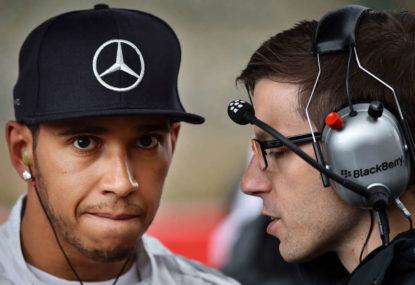Fernando Alonso's future is secure, now it's Lance Stroll's time to deliver for Aston Martin
It’s time that serious questions are asked of his Lance Stroll and his future in the team.

Oh, the injustice of sport. This sentiment has dominated headlines and discussion for almost a week: Lewis Hamilton and the Great Monaco Robbery.
It’s hard not to sympathise with the Briton. In his ninth attempt at the world’s most famous race – and after feeling cheated out of his best opportunity last year after that qualifying incident – he was well on his way to closing a near flawless weekend to take home just his second Monaco winner’s trophy.
It all went wrong quickly.
Max Verstappen vaulted himself over the back of Romain Grosjean, prompting a safety car.
The pit lane became its usual hive of activity as drivers attempted to cash in on inexpensive pit stops.
At some point in the flurry of action, Mercedes’ strategists incorrectly assessed that Hamilton could make a precautionary tyre change and still emerge ahead of second-placed teammate Nico Rosberg.
He didn’t.
Hamilton not only lost time to Rosberg, but also to Ferrari’s Sebastian Vettel, who was then in third. Around the twisty Monaco streets with just eight laps to race, his fate was sealed.
The victory Hamilton covets above all others was to elude him for another 12 months.
The pain of losing what should have been is felt ever more keenly by the man who has modelled his career – like so many others – on Ayrton Senna, who dominated the streets of Monaco like no other driver before or since.
It has not escaped Hamilton that, though he is likely to win a third championship to equal the Brazilian legend’s own title tally sooner rather than later, he has no justifiable claim to that central part of the Senna myth.
His trophy cabinet remains agonisingly bare of a Monaco memento.
But rooted in his psyche there must be – or ought to be, at very least – some feeling of culpability for bringing on the catastrophe, for while it is noble to forgive the team for its mistakes, it is arrogant to believe yourself above it.
It is an inescapable fact of the matter than Hamilton had as much a hand as his pit wall in his own undoing. He was undeniably the trigger of the calamity.
Somewhere along the way between the initialising of the virtual safety car and that final defining pit stop, Hamilton cruised past one of the giant spectator televisions alongside the circuit.
The giant pixels showed the Mercedes mechanics had leapt from their seats and into position at the pit box, ready for, or having just seen off, one of their cars.
He smelt mutiny.
He thought his team was rolling the dice for a Rosberg win. The pit stop would been more advantageous still if Rosberg had pitted before the real safety car was deployed to bunch up the field.
His teammate would be sat right behind him on newer, softer, warmer tyres ahead of an eight-lap sprint for victory. Hamilton panicked. He bypassed the clarification stage and went straight on the offensive.
“These tyres are going to drop in temperature,” Hamilton recalled telling his team after it rebuffed his request to change tyres like his imaginary teammate had done.
The Briton applied pressure until his team cracked and gave in. It calculated, based on the rapidly changing data available to it, that there was a just-workable margin for Hamilton to change tyres and re-emerge in the lead. They granted his wish.
“What’s happened, guys?” he radioed back to the pit wall. The rest of the story has been well recounted. By the time the plan was executed the mathematics were out of date. Hamilton finished third.
“I’ve lost the race, haven’t I?” he summed moodily as the race resumed.
Perhaps somewhere in the back of his head Hamilton was processing his guilt.
“You rely on the team,” said Hamilton half-heartedly after the race.
“Without thinking I came in with full confidence the others had done the same.”
Was it a decision borne of the rashness of old Lewis? Was this desperation springing from the need to correct the perceived injustice of 2014?
Or was it a combination of the two, manifesting itself in a cold paranoia in which even his own team, the same team on which he claims to rely and for which he claims to race, is against him?
Now the chequered flag. Emotions were running with confirmation that he had allowed victory to slip from his fingers. Then somewhere on the warm-down lap he slowed.
It is poetic – or probably overly dramatic – that Hamilton should have chosen Portier to temporarily stop his car.
It was at that corner that Senna famously crashed from the lead with just 12 laps to go, apparently spooked by teammate Alain Prost setting fastest laps behind him.
Ron Dennis had told Senna to slow, that his margin over Prost was unassailable. Senna refused to let it go. Certain victory was lost.
Perhaps Hamilton, just as Senna did 27 years earlier, realised that he had been integral to his own downfall.